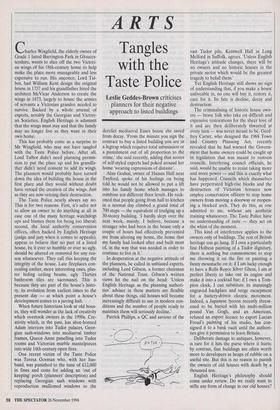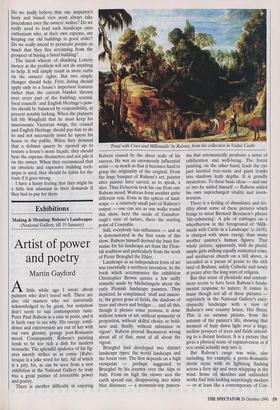ARTS
Tangles with the Taste Police
Leslie Geddes-Brown criticises planners for their negative approach to listed buildings Charles Wingfield, the elderly owner of Grade 1 listed Barrington Park in Glouces- tershire, wants to slice off the two Victori- an wings of his 18th-century home to help make the place more manageable and less expensive to run. His ancestor, Lord Tal- bot, had William Kent design the original house in 1737 and his grandfather hired the architect McVicar Anderson to create the wings in 1873, largely to house the armies of servants a Victorian grandee needed to survive. Backed by a whole arsenal of experts, notably the Georgian and Victori- an Societies, English. Heritage is adamant that the wings must stay and that the family may no longer live as they want in their own home.
This has probably come as a surprise to Mr Wingfield, who may not have tangled with the Taste Police before. After all, Lord Talbot didn't need planning permis- sion to put the place up and his grandfa- ther didn't need consent to add its wings. The planners would probably have turned down the idea of building the house in the first place and they would without doubt have vetoed the creation of the wings. Just as they are now vetoing their destruction.
The Taste Police nearly always say no. This is for two reasons. First, it's safer not to allow an owner to do anything at all in case one of the many heritage watchdogs ups and blames them for being too liberal; second, the local authority conservation offices, often backed by English Heritage (judge and jury when it comes to appeals), appear to believe that no part of a listed house, be it ever so humble or ever so ugly, should be altered or removed for any rea- son whatsoever. They call this keeping the integrity of the house. Late fireplaces con- cealing earlier, more interesting ones, plas- ter hiding ceiling beams, ugly Thirties bathroom tiles are sacrosanct. This is because they are part of the house's histo- ry, its evolution from earliest times to the present day — at which point a house's development comes to a jarring halt.
When future historians look at old hous- es, they will wonder at the lack of creativity which overtook owners in the 1990s. Cre- ativity which, in the past, has shoe-horned Adam interiors into Tudor palaces, Geor- gian sash-windows into mediaeval timber frames, Queen Anne panelling into Tudor rooms and Victorian marble mantelpieces into wide 16th-century open fires.
One recent victim of the Taste Police was Teresa Gorman who, with her hus- band, was punished to the tune of £12,000 in fines and costs for adding an 'out of keeping' porch (planners' description) and replacing Georgian sash windows with reproduction mullioned windows to the
derelict mediaeval Essex house she saved from decay. 'From the minute you sign the contract to buy a listed building you are in a legtrap which requires total submission or a punishment out of all proportion to the crime,' she said recently, adding that scores of self-styled experts had poked around her home 'wearing expressions of distaste'.
Alan Godsal, owner of Haines Hall near Twyford, spoke of his feelings on being told he would not be allowed to put a lift into his family home which manages to combine ten different floor levels. He reck- oned that people going from hall to kitchen in a normal day climbed a grand total of 700 steps — the equivalent of trudging up a 30-storey building. 'I hardly slept over the next week, mainly, I believe, because a stranger who had been in the house only a couple of hours had effectively prevented me from altering my home, the home that my family had looked after and built most of, in the way that was needed in order to continue to live in it.'
In desperation at the negative attitude of the planners, he called in unbiased experts, including Lord Gibson, a former chairman of the National Trust. Gibson's written views hit the nail on the head: 'Unless English Heritage as the planning authori- ties' adviser in these matters are flexible about these things, old houses will become increasingly difficult to use in modern con- ditions and the number of people ready to maintain them will seriously decline.'
Patrick Phillips, a QC and saviour of the vast Tudor pile, Kentwell Hall in Long Melford in Suffolk, agrees. 'Unless English Heritage's attitude changes, there will be no owners and no historic houses in the private sector which would be the greatest tragedy to befall them.'
Yet English Heritage still shows no sign of understanding that, if you make a house unliveable in, no one will buy it, restore it, care for it. Its fate is decline, decay and destruction.
The criminalising of historic house own- ers — brave folk who take on difficult and expensive restorations for the sheer love of it and are then deliberately thwarted at every turn — was never meant to be. Geof- frey Carter, who designed the 1968 Town and Country Planning Act, recently revealed that he had warned the Govern- ment that home owners could be caught up in legislation that was meant to restrain councils. Interfering council officials, he said, would be unable to resist taking more and more power — and this is exactly what has happened. Councils which themselves have perpetrated high-rise blocks and the destruction of Victorian terraces now employ conservation officers to stop home owners from moving a doorway or reopen- ing a blocked arch. They do this, as one admitted to me, without any aesthetic training whatsoever. The Taste Police have no understanding of taste — they act on the whim of the moment.
This kind of interference applies to the owners only of buildings. The rest of British heritage can go hang. If I own a particularly fine Holbein painting of a Tudor dignitary, there is nothing but commonsense to stop me throwing it on the fire or painting a funny moustache on it; if I am lucky enough to have a Rolls Royce Silver Ghost, I am at perfect liberty to take out its engine and make it into a cocktail bar; if I own a Tom- pion clock, I can substitute its stunningly engraved backplate and verge escarpment for a battery-driven electric movement. Indeed, a Japanese tycoon recently threat- ened to be buried with his multi-million pound Van Gogh, and an American, refused an export licence to export Lucian Freud's painting of his studio, has con- signed it to a bank vault until the authori- ties give it permission to leave Britain.
Deliberate damage to antiques, however, is rare for it hits the purse where it hurts; by contrast, fine buildings are often worth more to developers as heaps of rubble on a useful site. But this is no reason to punish the owners of old houses with death by a thousand nos.
English Heritage's philosophy should come under review. Do we really want to stifle any form of change in our old houses? Do we really believe that one inspector's hasty and biased view must always take precedence over the owners' wishes? Do we really need to load such handicaps onto enthusiasts who, at their own expense, are keeping our old buildings in good order? Do we really intend to persecute people so much that they flee screaming from the prospect of buying a listed building?
The latest wheeze of chucking Lottery money at the problem will not do anything to help. It will simply result in more curbs on the owners' rights. But two simple changes should help. First, listing should apply only to a house's important features rather than the current blanket thrown over every part of the building; second, local councils' and English Heritage's pow- ers should be balanced by responsibility, at present notably lacking. When the planners tell Mr Wingfield that he must keep his uneconomic Victorian wings, the council and English Heritage should pay him to do so and not necessarily insist he opens his house to the public. When they demand that a defunct quarry be opened up to restore a house's stone façade, they should bear the expense themselves and not pile it • on the owner. When they recommend that an obsolete and expensive building tech- nique is used, they should be liable for the costs if it goes wrong. I have a funny feeling that they might be a little less adamant in their demands if they had to pay for them.



















































































 Previous page
Previous page